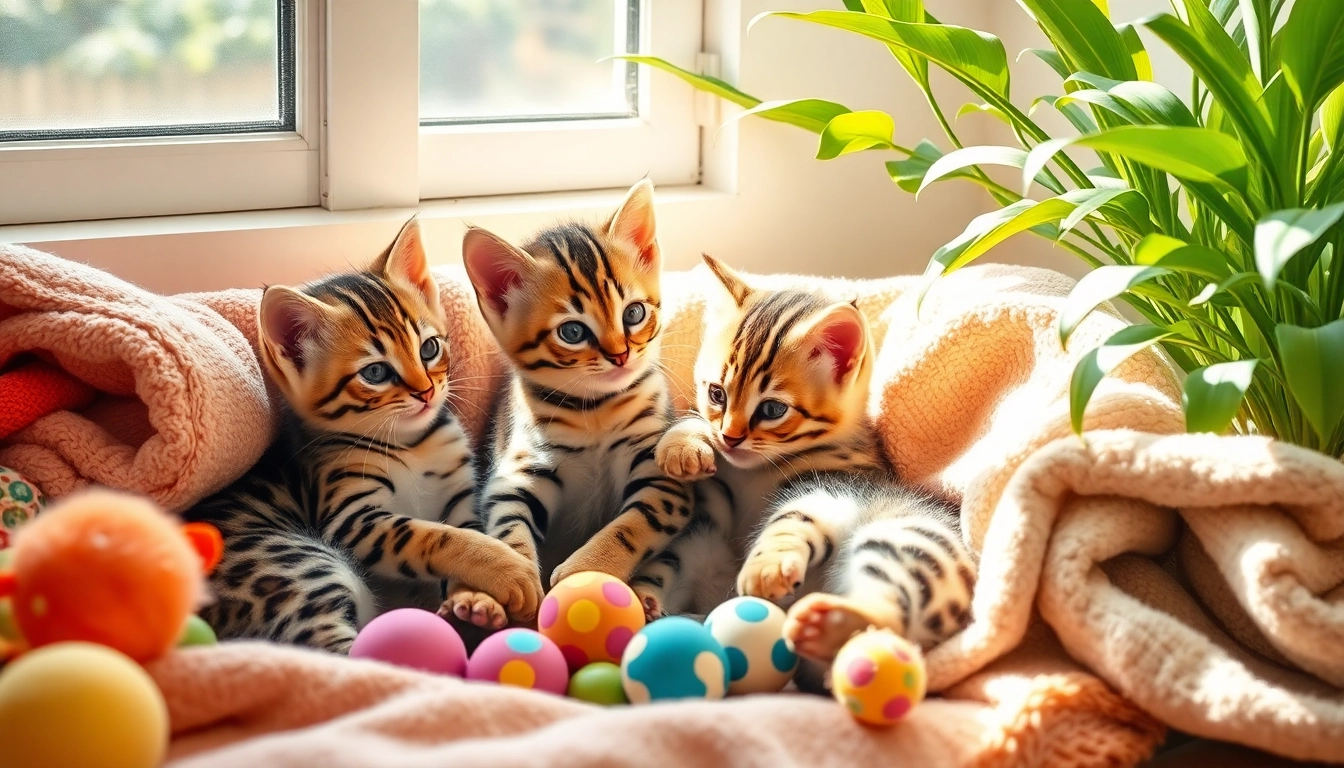Understanding the Bengal Breed
The Bengal cat, a strikingly beautiful breed with origins linked to wild Asian leopard cats, has captured the hearts of feline enthusiasts worldwide. If you are considering welcoming a Bengal into your home, it’s essential to understand their unique traits and behaviors. This knowledge not only aids in selecting the right breeder but also ensures a successful integration of your new furry friend into your living space. For those specifically searching for Bengal Breeders Orange County, this article provides comprehensive insights into the breed as well as reliable breeding options in the area.
Characteristics of Bengal Cats
Bengals are renowned for their exceptional appearance and vibrant personality. They have a distinctive coat pattern that reflects their wild ancestry, characterized by rosettes reminiscent of a leopard’s spots. Their fur is soft and luxurious, often displaying a glittery sheen, which adds to their allure. Here are some notable traits:
- Size and Build: Bengals are medium to large-sized cats with a muscular build. They have long legs, a long tail, and a broad, wedge-shaped head.
- Coat Colors: The breed comes in various colors, including brown, snow, and silver. Each coat features unique patterns, from spots to marbling.
- Eyes: Bengals have stunning almond-shaped eyes, often in shades of green or gold, which add to their expressive demeanor.
Bengal Temperament and Behavior
Bengals are not just a pretty face; their temperament sets them apart as well. Generally, they are known for being active, playful, and intelligent. They thrive on interaction and mental stimulation, making them ideal companions for more engaged pet owners. Key aspects of their behavior include:
- Energy Level: Bengals possess a high energy level and require plenty of playtime and exercise to stay healthy and happy.
- Social Nature: They are inherently social cats, often forming strong bonds with their human families and even other pets.
- Curiosity: Their inquisitive nature can lead them to explore every nook and cranny in your house, which may require child-proofing or cat-proofing certain areas.
Common Health Concerns in Bengals
While Bengals are generally healthy, they are predisposed to specific genetic health issues like any breed. Responsible breeders prioritize health screenings for their breeding cats to reduce the risk of hereditary conditions. Common health concerns include:
- Hypertrophic Cardiomyopathy (HCM): HCM is a common heart disease in which the heart muscle becomes abnormally thick, leading to potential heart failure.
- Progressive Retinal Atrophy (PRA): This is a degenerative eye condition that can lead to blindness.
- Hip Dysplasia: Although less common than in larger breeds, hip dysplasia can occur and result in mobility issues.
Top Bengal Breeders in Orange County
When searching for a Bengal kitten, locating a reputable breeder is crucial. A responsible breeder will prioritize the health and temperament of their cats, ensuring that they adhere to breed standards set by organizations like The International Cat Association (TICA). Below are tips and profiles of notable Bengal breeders in Orange County.
Criteria for Selecting a Responsible Breeder
Choosing the right breeder is essential for ensuring the health and wellbeing of your future Bengal cat. Here are critical criteria to consider:
- TICA Registration: Always look for breeders registered with TICA or similar organizations, as this ensures adherence to ethical breeding practices.
- Health Testing: Reputable breeders conduct health tests on their breeding cats to screen for common genetic diseases.
- Transparency: A good breeder should be open about their breeding practices, health testing, and provide references from previous clients.
- Home Visits: Responsible breeders will often encourage potential buyers to visit their cattery, as this demonstrates confidence in their breeding environment.
Profiles of Leading Bengal Breeders
Here are some of the well-regarded Bengal breeders in Orange County:
- Baby Bengals – Located in Orange County, this cattery is known for its TICA-registered Bengal kittens, boasting champion bloodlines and beautiful rosettes. Their breeding program reflects a commitment to health and temperament.
- Bengal Babies – Known for their captivating kitten personalities and health-focused breeding practices, they offer a range of Bengal kittens available for adoption.
- Purfect Pride Bengals – A TICA-registered cattery situated in South OC, known for its strong emphasis on health testing and community involvement.
- Arkham Bengals – This small cattery has gained a reputation for raising carefully selected Bengal cats in a family setting, focusing on proper socialization.
What to Expect from Breeders in Orange County
When you connect with breeders in Orange County, you can anticipate a professional and informative experience. Most reputable breeders will provide:
- Health Information: Detailed health records of the kittens and their parents.
- Contractual Obligations: A purchase agreement that outlines ownership, health guarantees, and return policies.
- After-Sale Support: Many breeders are committed to offering support and guidance after you bring your kitten home.
Choosing the Right Bengal Kitten
Once you find a breeder you trust, selecting the appropriate Bengal kitten for your home involves assessing individual personalities and ensuring their health. Understanding what to look for can enhance your experience and ensure a pleasant transition for both you and your new pet.
Assessing Kitten Temperament
Each Bengal kitten has its personality, and observing their behavior can provide insights into their future behavior as adults. Here are a few tips for evaluating kitten temperament:
- Playfulness: Kittens who engage enthusiastically with toys and interact with their siblings often possess a healthy play drive.
- Socialization: Look for kittens that show an interest in human interaction and are exposed to various stimuli to gauge their adaptability.
- Behavioral Signs: Watch for signs of confidence versus shyness to help identify a kitten’s temperament. A balanced kitten will be curious without being overly aggressive or timid.
Health Checks and Documentation to Look For
Health documentation is vital when bringing a Bengal kitten into your home. Make sure to inquire about the following:
- Vaccination Records: Ensure the kitten is up to date on vaccinations and receive records to verify this.
- Health Guarantees: Look for breeders who provide a health guarantee for their kittens, indicating trust in the quality of their breeding practices.
- Spay/Neuter Agreement: Responsible breeders will often have a spay/neuter agreement to prevent overbreeding and ensure feline welfare.
Adapting Your Home for a Bengal Kitten
To provide the best environment for your new Bengal kitten, consider implementing a few adjustments in your home:
- Safe Space: Create a dedicated space with comfortable bedding, litter box access, and toys for the kitten to feel secure.
- Interactive Toys: Invest in interactive toys that challenge their curiosity and intelligence, keeping them mentally stimulated.
- Cat-Proofing: Ensure that your home is safe by securing cords, valuables, and hazardous substances that cats might encounter while exploring.
Frequently Asked Questions About Bengal Cats
Many potential Bengal owners have common questions about the breed. Here are some of the most frequently asked inquiries answered.
How Much Should I Expect to Spend?
Prices for Bengal kittens can vary significantly based on lineage, breeding quality, and breeder reputation. Generally, expect to pay anywhere from $1,000 to over $3,000 for a Bengal kitten from a reputable breeder. It’s vital to consider this cost alongside the lifelong expenses of pet ownership, including food, healthcare, and emergencies.
Are Bengals Good with Children and Other Pets?
Bengals are typically very social and affectionate, making them suitable companions for families with children and other pets. However, early socialization and interaction are key. Bengals who have been well socialized tend to adapt better and display less aggression towards other animals and children.
What is the Lifespan of a Bengal Cat?
The average lifespan of a Bengal cat ranges between 12 to 16 years, with proper care, nutrition, and regular veterinary check-ups significantly contributing to their longevity.
Resources for Bengal Cat Owners
Owning a Bengal cat can be an incredibly rewarding experience, and various resources are available to assist you in providing the best care for your feline friend.
Joining Communities and Forums
Joining communities, both online and locally, is a fantastic way to connect with fellow Bengal enthusiasts. These forums often offer valuable advice, share experiences, and provide support. Look for local Facebook groups or cat forums dedicated to Bengal owners.
Recommended Products for Bengal Care
Investing in quality products can enhance your Bengal’s lifestyle. Here are some essentials:
- High-Quality Cat Food: Choose premium, protein-rich food tailored for active cats to maintain their energy levels and overall health.
- Interactive Toys: Toys that stimulate their mind and encourage physical activity will keep your Bengal entertained and well-exercised.
- Climbing Trees: Bengals love to climb, so investing in a tall cat tree can provide them with an outlet for their natural instincts.
Training Tips for New Bengal Owners
Training your Bengal can be both enjoyable and rewarding. Here are some tips to keep in mind:
- Consistency is Key: Establish routines for feeding, playtime, and litter box training to help your kitten adapt to life in your home.
- Positive Reinforcement: Use treats and praise to encourage good behavior rather than punishment, which can lead to anxiety.
- Socialization: Introduce your Bengal to different environments, experiences, and people for a well-adjusted adult cat.



